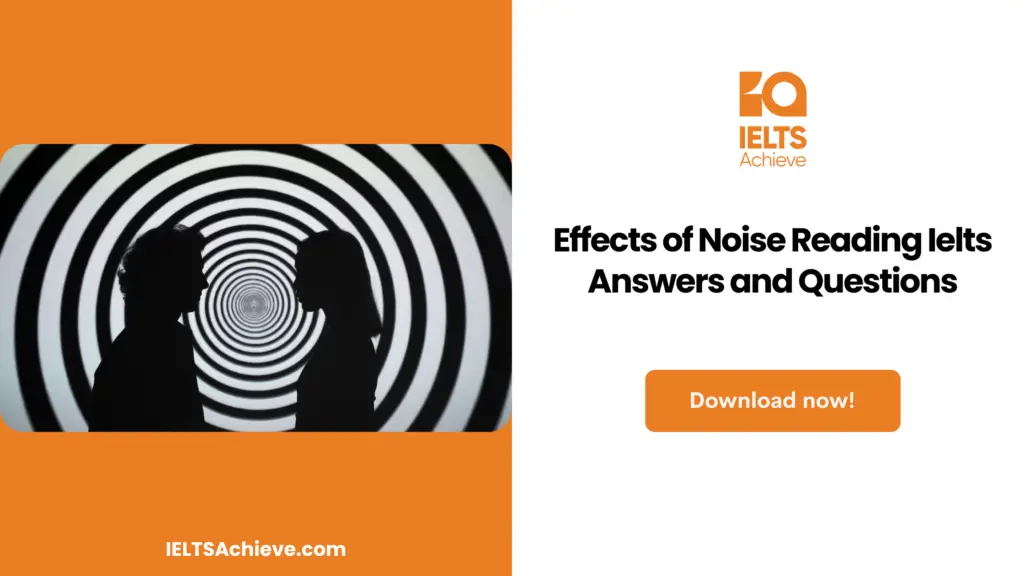The Blog post contains the following IELTS Reading Questions:
- IELTS reading Matching sentence endings
IELTS Reading Passage – Effects of Noise

Effects of Noise
Generally, it is reasonable to suppose that we must choose peace and silence over noise. Most of us would have experienced adjusting to sleeping on top of the mountains or the village side as it was ‘very quiet’ at an early stage, an incident that reflects that humans can adapt to different levels of noises. There are also many research studies that support this thought. For instance, Glass and Singer (1972) presented humans to quick bursts of loud noise and then assessed their skills to solve issues and problems and their physiological response to the same noise. The noise was disturbing initially, then four minutes later the response were doing fine on their assignments as a control response who did not hear of that noise. It is observed that their physiological response declined quickly, same as the levels as those of the control response.
Interestingly, there are limitations to the level of adaptation, and loud noise tends to be an obstacle if the individual wants to focus on more than one assignment. For instance, loud noise levels are caused with the response of the individual who needs to watch three dials at the same time, an assignment not similar to that of a pilot (an aeroplane) or like an air-traffic controller (Broadbent, 1957). Likewise, noise did not cause an impact on an individual’s ability to find out a moving line with a steering wheel however it did interact or interfere with the individual’s skill to redo numbers while finding it out or tracking (Finkelman and Glass, 1970).
Here, the most important observation from research study on noise is that the noise was anticipated more than how loud it would be. We could ‘tune out’ severe background noises, wherever if it is louder than to work under situations with unpredictable intrusions of noise. In the Glass and Singer research study, where individuals were left to so much of noise as they were working on an assignment, some individuals could hear loud noises, and others could hear soft noises. For some individuals, the noise bursts were spaced similarly to one minute away (predictable noise); others could hear the exact frequency of noise, but the noise bursts happened at irregular timings (unpredictable noise).
| Unpredictable Noise | Predictable Noise | Average | |
| Loud noise | 40.1 | 31.8 | 35.9 |
| Soft noise | 36.7 | 27.4 | 32.1 |
| Average | 38.4 | 29.6 |
Table 1: Proofreading Errors and Noise
D. Individuals gave inputs pertaining to the predictable and unpredictable noise equally annoying, and all individuals responded at about the equal level while the noise portion of the research study. On the other hand, the diverse noise conditions had little difference when the individuals wanted to correct and proofread written material when there was no noise. As shown in Table 1 the unpredictable noise caused more mistakes in the later proofreading assignment than predictable noise; and soft, unpredictable noise merely caused little more mistakes on this assignment than the loud, predictable noise. E. Seemingly, unpredictable noise causes more discomfort than predictable noise, however it takes its own time for this discomfort to take its toll in response. In this research study, predictability is not the only variable that diminishes totally or partially the bad effects of noise. The other variable is control. If the individual is aware of the fact that they could operate and control the noise system, this might reduce both its bad effects while performing and its post-performance level. It’s real even if the individual decides not to turn off the noise (Glass and Singer, 1972). It is true even if the individual never actually exercises his or her option to turn the noise off (Glass and Singer, 1972). It’s known that one can control the noise, and it is enough.
F. The various studies discussed till now reveal that people exposed to noise for short timings have observed only transient effects, as per the study. But the most troublesome issue about noisy environments is that living and listening to the chronic noise everyday may result in serious, prolonged effects. One of the studies suggest that this issue is a realistic one, in comparison with the elementary school students who attended classes close to the Los Angeles’ busy airport with students who attended classes in less noisy neighbourhoods (Cohen et al., 1980). It was observed from the study that children from the schools where there is loud noise had higher blood pressure and tended to get distracted often than those who attended the schools where there is less noise. In addition to that, there was no sign of adjustment or adaptation to the noise. Apparently, the more the children had attended the noisy schools, the more disturbed it was. These repercussions were also long lasting and did not stop. Apart from that, there was a follow-up research study that observed that children who were shifted to less noisy environments never stopped from having greater distractibility than students who had always been in the quiet schools (Cohen et al, 1981). This experiment was done one year later. It ought to be noted that the two sets of children had been carefully analysed by the tutors in order to compare their race, caste, age, ethnic group and social classes.
Unlock your full potential in the IELTS Reading section – Visit our IELTS Reading Practice Question Answer page now!
Recommended Questions:
Renewable Energy IELTS Reading Question with Answer
Effects of Noise Reading Questions
Questions 1 – 7
This reading passage has six paragraphs, A – F.
Which paragraph contains the following information?
Write the correct letter, A – F, as your answer to each question.
- The other variable is control
- The noise was disturbing initially, then four minutes later the response were doing fine
- The diverse noise conditions had little difference when the individuals wanted to correct and proofread written material when there was no noise
- the more the children had attended the noisy schools, the more disturbed it was
- For some individuals, the noise bursts were spaced similarly to one minute away
- Noise did not cause an impact on an individual’s ability to find out a moving line with a steering wheel
- The unpredictable noise caused more mistakes in the later proofreading assignment than predictable noise
Questions 8 – 13
Complete each sentence with the correct ending
Write the correct letter a-f from the options.
8. Glass and Singer (1972) presented humans to quick bursts
9. Apparently, the more the children had attended the noisy schools
10. noise did not cause an impact on an individual’s ability
11. In this research study, predictability is not the only variable
12. The noise was disturbing initially13. The most important observation from research study on noise
- the more disturbed it was
- that diminishes totally or partially the bad effects of noise
- then four minutes later the response were doing fine
- to find out a moving line with a steering wheel
- of loud noise and then assessed their skills to solve issues
- is that the noise was anticipated more than how loud it would be
Ready to sharpen your skills in Matching Sentence Endings? Click here to discover expert strategies and techniques for accurately matching sentence endings with the corresponding information in the IELTS Reading section.
Unlock your full potential in the IELTS Reading section – Visit our IELTS Reading Practice Question Answer page now!
Recommended Questions:
Renewable Energy IELTS Reading Question with Answer
Effects of Noise Reading Answers Key
1. Paragraph E
2. Paragraph A
3. Paragraph D
4. Paragraph F
5. Paragraph C
6. Paragraph B
7. Paragraph D
8. E
9. A
10. D
11. B
12. C
13. F

We hope you found this post useful in helping you to study for the IELTS Test. If you have any questions please let us know in the comments below or on the Facebook page.
The best way to keep up to date with posts like this is to like us on Facebook, then follow us on Instagram and Pinterest. If you need help preparing for the IELTS Test, join the IELTS Achieve Academy and see how we can assist you to achieve your desired band score. We offer an essay correction service, mock exams and online courses.


